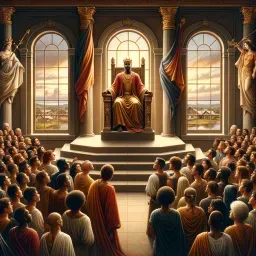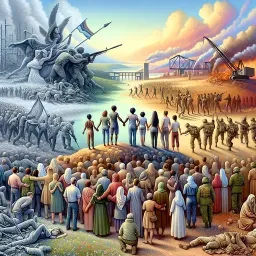To live in hearts we leave behind is not to die

0
0
0
0
- Meaning
- This phrase emphasizes the idea that a person lives on through the memories and love of those they leave behind. It suggests a form of immortality achieved by leaving a lasting, positive impact on others. Philosophically, it implies that the true essence of life transcends physical existence and finds continuity in the hearts and minds of others.
- Allegory
- In this allegorical image, the luminescent figure represents the person who lives on in the hearts they’ve touched. The surrounding hearts emitting warm light symbolize the love and memories shared by those still living. The twilight landscape signifies the transition between life and death, underscoring the boundary between physical disappearance and lasting remembrance. The blooming flowers and flourishing trees indicate growth and impact, signifying the positive influence the deceased had on other lives. The serene expressions on the silhouettes suggest how the memory of the departed offers comfort and remains cherished.
- Applicability
- In personal life, this phrase can be a source of comfort during times of loss, reminding people that the love and memories of a departed loved one keep their spirit alive. It encourages people to live in such a way that they make a positive, lasting impression on others.
- Impact
- This phrase has had a significant cultural impact, often used in epitaphs and memorial services to console the grieving by focusing on the lasting influence of the deceased. It's inspired countless other pieces of literature, poetry, and speeches that address themes of love, memory, and the human condition.
- Historical Context
- Thomas Campbell wrote this phrase in the early 19th century. The historical period following the French Revolution was filled with a sense of renewal and was also a time when Romantic poets emphasized emotion, individualism, and the connection with nature and others.
- Criticisms
- Critics might argue this phrase overly romanticizes death and grieving. Some may contend that it downplays the immediate and traumatic loss felt when a loved one dies. Additionally, those with a more materialistic or rationalist worldview might question the notion of a legacy as a form of immortality.
- Variations
- Variations of this phrase exist in many cultures, often in the context of honoring the dead or emphasizing the importance of living a meaningful life. For instance, numerous traditions, from Dia de los Muertos in Mexico to the concept of ancestral veneration in Asian cultures, reflect similar ideas.
-

I am the way, the truth, and the life; no one comes to the Father except through me.
-

It is better to be feared than loved, if you cannot be both.
-

I've seen things you people wouldn't believe, attack ships on fire off the shoulder of Orion, I watched c-beams glitter in the dark near the Tannhäuser Gate. All those moments will be lost in time, like tears in rain. Time to die.
-

Love is composed of a single soul inhabiting two bodies.
-

He who fights with monsters should be careful lest he thereby become a monster.
-

I am your father.
-

If you tell the truth, you don't have to remember anything.
-

We have met the enemy and they are ours.
-

La ponctuality is the politeness of kings.
No Comments